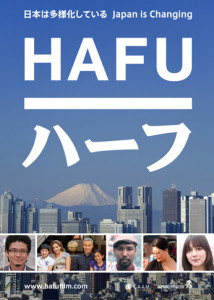
Hafu: The Mixed-Race Experience in Japan premieres in New York July 28. For more information, click here.
By Stacy Smith (Kumamoto-ken CIR, 2000-03) for JQ magazine. Stacy is a professional Japanese writer/interpreter/translator. She starts her day by watching Fujisankei’s newscast in Japanese, and shares some of the interesting tidbits and trends together with her own observations in the periodic series WITLife.
This weekend the annual Asian American International Film Festival will screen the new documentary Hafu: The Mixed-Race Experience in Japan (the title being the Romanization of “half” in Japanese), made by filmmakers Megumi Nishikura and Lara Perez Takagi and. Both half Japanese themselves, these women were inspired to undertake this project due to the lack of media attention on hafus and frustration with the shallow adoration of hafu celebrities on Japanese television.
The film begins with some informative statistics, such as that 2% of Japan’s population is foreign born and a striking 1 out of 49 babies is born to a family with a non-Japanese parent. These numbers have grown greatly over the last 30 years, and yet Japan is still lacking in its understanding of this diverse populace. Hafu features five half Japanese subjects, and their struggles and successes living in Japan today.
One of the families profiled is comprised of a Japanese father and a Mexican mother, who met while studying abroad in the U.S. They later married and now live in Nagoya with their two children. The older one, nine-year-old Alex, is having a hard time at his local school as the other kids tease him for being “English.” Alex’s parents believe that he needs a change in environment and decide to transfer him to an international school. He asks to spend some time in Mexico before the transition, and comes back from this trip brimming with confidence and an easing of the stutter that plagued him when he was being bullied (which his teachers had turned a blind eye to). Alex goes on to love his new school, make friends, and feel comfortable in his own skin without having to worry about being hafu.
Fusae, a 35-year-old Korean Japanese living in Kobe, did not know the truth of her heritage until she happened to find out her father’s true ethnicity when she had to access her family register at age 15. At that time, her Japanese mother disclosed what she had kept hidden from Fusae her whole life, and explained that she concealed this information to protect her daughter from prejudice. Fusae begins to question her identity, wishing she was 100% one or the other. It is not until she becomes affiliated with Mixed Roots Kansai, a group which supports those of diverse backgrounds, that she comes to appreciate how lucky she is and to celebrate both cultures.
The story to which I could most relate was that of 27-year-old Sophia, whose father is Japanese and who was raised in Australia with periodic visits to Japan when she was young. As an adult, she wants to discover her roots and moves to Tokyo to learn more about Japanese language and culture. She is devoted to her studies and is determined to make friends with whom she can practice her Japanese. However, she finds herself hanging out with mostly foreigners and speaking lots of English as a result. She opts to return home after a little over a year and says, “I don’t like that no matter how long you live here, you will never be accepted as Japanese. You will always be foreign.” This feeling is surely something that resonates strongly with many JETs.
However, it is because of JET and other international exchange endeavors that Japanese society is more open than it has ever been, and it is continually moving in this direction. The film closes with graphics illustrating the increasing numbers of Japanese living abroad and foreigners living in Japan, as well as of international marriages involving Japanese. These are all trends that will continue to grow in the years to come. Clearly Japan has made significant progress, but needs to further adapt to ensure that its social mores reflect the reality of its ever-diversifying population.
Hafu: The Mixed-Race Experience in Japan premieres in New York July 28 at Anthology Film Archives at 32 Second Avenue. For more information, click here.


one comment so far...
Will there be a DVD for Hafu?